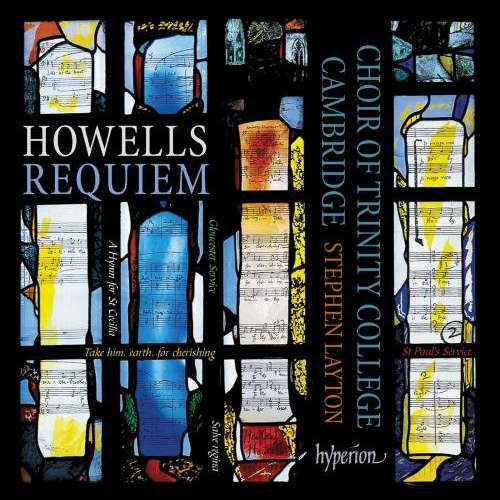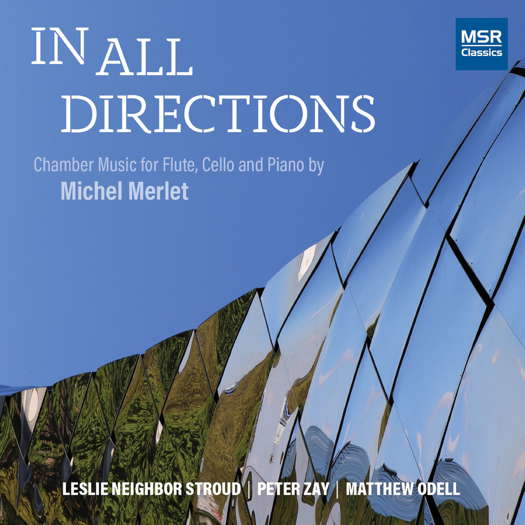- Louise Reichardt
- Da Vinci Publishing
- John McCabe CBE
- Origin Records
- Mussorgsky
- Giovanni Gabrieli
- Romain Rolland
- Berlioz: Les Troyens
 DISCUSSION: John Dante Prevedini leads a discussion about Composers, individuals or collective?, including contributions from David Arditti, Halida Dinova, Robert McCarney and Jane Stanley.
DISCUSSION: John Dante Prevedini leads a discussion about Composers, individuals or collective?, including contributions from David Arditti, Halida Dinova, Robert McCarney and Jane Stanley.
 SPONSORED: CD Spotlight. Beautifully Apt - Choral music by Herbert Howells, heard by Robert Anderson.
SPONSORED: CD Spotlight. Beautifully Apt - Choral music by Herbert Howells, heard by Robert Anderson.
All sponsored features >>

A Very Fine Disc
GEOFF PEARCE enjoys chamber music by contemporary French composer Michel Merlet
'... polished and inspired performances.'
I was not at all familiar with the music of French composer Michel Merlet (born in Saint-Brieuc, 1938), but I learned that he was a student of Tony Aubin, André Jolivet and Olivier Messiaen, so this piqued my interest. Amongst other awards and achievements, he was a Prix de Rome recipient. French composers very often write exceptionally well for wind, and the flute in particular, so this was a release I had to hear.
The first piece, En tous sens pour flûte et piano (1966), Merlet's Opus 11, is an interesting, short evocative work. To quote the attached booklet:
En tous sens ... is in Merlet's words a 'musical illustration' of Jules Laforgue's poem Apothéose ('In all directions, forever, Silence is teeming / Clusters of gold stars mixing their swirls ...')
Merlet alternates two ideas, one lyrical and the other rhythmic, in this brief musical picture. It is a delightful piece that captivated me immediately.
Listen — Michel Merlet: En tous sens
(MS 1849 track 1, 1:38-2:22) ℗ 2024 Matthew Odell and Leslie Neighbor Stroud :
The next work, written two years later than the first piece, Sonatine en trois mouvements, reminded me somewhat of the solo sonatas of Dutilleux, and is not, as the title suggests, a diminutive piece, but a quite difficult composition of thirteen-and-a-half minutes. One thing I generally like about French music is its clarity: even if the piano writing is sometimes dense, there never is any danger of the flute being swamped. There are also frequently passages where the flute plays alone. The second movement is a rather quirky scherzo - very colourful and quite rhythmically complex. I love this little movement.
Listen — Michel Merlet: Très vite (Sonatine en trois mouvements)
(MS 1849 track 3, 0:00-0:47) ℗ 2024 Matthew Odell and Leslie Neighbor Stroud :
The final movement is quite changeable in mood, at once dramatic, then seductive and then dance-like. There is some beautiful writing between the piano and flute. It would be difficult to perform and is a real tour de force.
Une soirée à Nohant, an elegy for cello and piano, was composed in 1979 as a commission by the Paris Concervatoire. There are references to Chopin and also similarities with Gabriel Fauré's Elegie for Cello and Piano. This beautifully well written work requires a lyrical tone, a strong technique and a lot of special effects, especially in the extended central cadenza, so there is much to enjoy here.
Listen — Michel Merlet: Une soirée à Nohant
(MS 1849 track 5, 4:55-5:46) ℗ 2024 Matthew Odell and Leslie Neighbor Stroud :
Chacone, Op 18 was written in 1970 for the Paris Conservatoire's annual flute competition. It really tests the flautist's ability to provide contrast over the whole range of the instrument and would be a challenging test piece.
Listen — Michel Merlet: Chacone, Op 18
(MS 1849 track 6, 2:51-3:37) ℗ 2024 Matthew Odell and Leslie Neighbor Stroud :
Le roque de sol-ut-ré, three pieces for solo flute, originally written and performed by Patrick Gallois, is an ambitious and quite astounding work, using quite a lot of extended techniques, such as pizzicato, singing while playing, tongue rams, multiphonics and whistle tones - not at all in a gimmicky sense, but as an integral part of the music, such as in the second movement, Passacaglia, as variations, and in the final Fugue as counterpoint.
Listen — Michel Merlet: Passacaille - Moderato (Le roque de sol-ut-ré)
(MS 1849 track 8, 0:48-1:12) ℗ 2024 Matthew Odell and Leslie Neighbor Stroud :
The opening prelude reminds me of birdsong.
Prélude-Interlude-Postlude for cello and piano, Op 39 (1992) is a very interesting work. The prelude is actually that from J S Bach's first cello suite, and the interlude Merlet's original composition, the same length as the Bach piece but for solo piano. The final postlude combines both, and reminds me of the expansion and contraction of breathing.
Listen — Michel Merlet: Postlude (Prélude-Interlude-Postlude)
(MS 1849 track 12, 0:01-0:50) ℗ 2024 Matthew Odell & Leslie Neighbor Stroud :
The disc ends with Merlet's four movement Trio, Op 24, commissioned by the French Ministry of Culture in 1973, and originally scored for violin, cello and harpsichord, but ten years later, the composer rearranged it for flute, cello and piano. This is a substantial work of over twenty-one minutes, and full of contrast, invention and charm. I enjoyed this piece very much and consider it one of the finest modern pieces of chamber music that I have heard. The third movement theme - a passacaglia - is instantly recognisable, the variations are particularly inventive, and sometimes the theme is difficult to discern. The final Presto movement ends this work with a flourish.
Listen — Michel Merlet: Ostinato - Presto (Trio Op 24)
(MS 1849 track 16, 0:52-1:42) ℗ 2024 Matthew Odell & Leslie Neighbor Stroud :
The artists playing here - Leslie Neighbor Stroud, flute, Peter Zay, cello and Matthew Odell, piano - are all very accomplished and they produce polished and inspired performances. I would not like to single any of them out particularly because they are all so good, and this gives me a thirst to hear more of this fine composer. His output is not huge, but if these works, written with such charm and panache, are anything to go by, further investigation and recognition is deserved. The recording quality is exceptional and the programme notes are helpful. This is a very fine disc.
Copyright © 12 February 2025
Geoff Pearce,
Sydney, Australia



